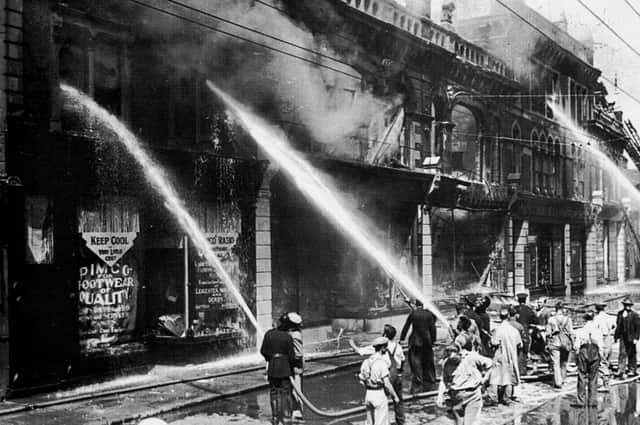Landmark Portsmouth store destroyed by fire | Nostalgia


In the early 1930s a larger store was built across the road on the western side, but in 1934 that building was destroyed by fire.
A few years later Co-operative House was built, but just four years on, in January 1941, that building was destroyed when the Luftwaffe came calling.
The point of this is the photograph seen above.
Advertisement
Hide AdAdvertisement
Hide AdNowadays, if there is a fire on this scale, the public are kept well away from the scene. But just look at the number of ‘civilians’ trying to assist in this photograph.
Apart from the firemen, no one has any protective clothing. Some are in overalls and one is wearing a brown work coat. Amazing.
I don’t know how long it took Portsmouth Fire Brigade to attend but as can be seen the building was destroyed by the fire.
On the left the advert in the window asks customers to keep cool at very little cost by wearing Pimco (Portsea Island Mutual Co-operative) footwear. In the opposite window, Pimco Radio is advertised.
After the war a new Co-Operative House was built.
Advertisement
Hide AdAdvertisement
Hide AdI wonder who can remember the magnificent staircases with their heavy-duty banisters.
That building was demolished in the early 1980s and a supermarket built on the site.
•I’ve just read the headline in The News about spitting not being tolerated.
Of course, it was aimed at the idiots who think it great fun to spit at police officers. But really it should also be aimed at footballers.
Advertisement
Hide AdAdvertisement
Hide AdWhy do these so called super-fit men have to spit on the pitch so often? I can think of few things worse than doing a sliding tackle and my thigh or arm sliding over phlegm another player has coughed up.
Surely FIFA should ban it and anyone caught doing it booked under the ungentlemanly conduct rule. Seen doing it again then they should be sent off under the double booking rule. The sooner this is implemented the better.
• I also read in The News that low-life yobs had broken into the Co-op in New Road, Fratton. Others had raided a chemist for baby materials.
Shouldn’t offences such as these now be treated as looting? There was a time when notices were put up saying: ‘Looters will be shot’. A little extreme perhaps but when caught these people should receive a maximum prison sentence don’t you think?
Advertisement
Hide AdAdvertisement
Hide Ad• During the present crisis there have been many mentions of the community spirit that existed in the Second World War.
It seems unlikely that foreign holidays will be allowed for some time and we may not even be able to travel within the UK for many months.
In 1945 Portsmouth Corporation donated £1,800 for the organisation called Stay-at-Home-Holidays.
So popular were the events organised to give enjoyment to residents on their own doorsteps that not a penny of the allocated money was used.
Advertisement
Hide AdAdvertisement
Hide AdThe many functions organised around Southsea especially attracted more than 75,000 people.
So perhaps that is the way forward this coming summer.
We have the bandstand, always popular with many attending. South Parade Pier could return to the days when it was popular with open air dances. And, of course there is always the Isle of Wight.
• My mention of Ed Abrook, the former Portsmouth boy who now lives in Canada who saved a boy, Philip Pennery, from the sea in 1948 brought in a phone call while I was presenting my show on Angel Radio.
I read out sections from my columns on my programme and mentioned the rescue.
Advertisement
Hide AdAdvertisement
Hide AdI then had a call to the studio from Derek Withers, of West Leigh, Havant, who said he used to work with Ed at Drings cardboard factory at Hilsea, Portsmouth, in the mid-1950s.
What are the chances of that occurring I wonder?
• As we know, Portchester became what was known in Roman times as Portus Magnus meaning ‘grand port’. The actual name derives from the latin (port) with the suffix ‘ceaster’.
So important was it that it became connected to Chichester in the east and Bittern in the west by a great Roman road.
But apparently there was also another road from Portchester which led to Winchester.
Advertisement
Hide AdAdvertisement
Hide AdIn Adam and Charles Black’s guidebook of 1879 it says that Portchester was also connected to Winchester by a great highway and that, at that time ‘abundant traces had yet to be discerned’.
Ivan D Margary tells us there was a road from Winchester to Wickham which possibly went onward to Portchester.
Has this road ever been defined does anyone know?
Comment Guidelines
National World encourages reader discussion on our stories. User feedback, insights and back-and-forth exchanges add a rich layer of context to reporting. Please review our Community Guidelines before commenting.